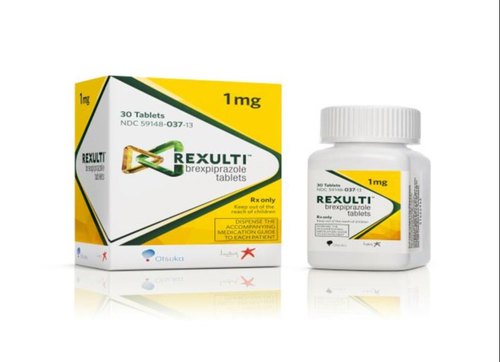Brexpiprazole (Rexulti): Uses, Mechanism of Action, Side Effects, Reviews

Brexpiprazole (Rexulti) is a prescription antipsychotic medicine used to treat schizophrenia in adults. Schizophrenia is a mental illness with symptoms such as delusions, disorganized thinking, and speech, suspiciousness, and hallucinations (seeing, hearing, or feeling things that are not there).
Brexpiprazole (Rexulti) is also FDA approved for the following indications:
• Adjunctive treatment of major depressive disorders. This means Brexpiprazole (Rexulti) is used in addition to an antidepressant to help treat depression.
This medication sheet will focus primarily on schizophrenia. You can find more information about depression here.
Brexpiprazole (Rexulti) may also be helpful when prescribed “off-label” for other mental health conditions. “Off-label” means that it has not been approved by the Food and Drug Administration for this condition. Your mental health provider should justify his or her thinking in recommending an “off-label” treatment. They should be clear about the limits of the research around that medication and if there are any other options.
How does Brexpiprazole (Rexulti) work?
Brexpiprazole the active ingredient in Rexulti is thought to attach to receptors (targets) in the brain for several neurotransmitters (substances nerve cells use to communicate with neighboring cells) including dopamine, serotonin, and noradrenaline. These neurotransmitters play a role in schizophrenia, and by acting at their receptors, Brexpiprazole (Rexulti) helps normalize the activity of the brain and reduce symptoms of schizophrenia.
What Is The Most Important Information I Should Know About Brexpiprazole (Rexulti)?
Schizophrenia requires long-term treatment. Do not stop taking Brexpiprazole (Rexulti), even when you feel better.
With input from you, your health care provider will assess how long you will need to take the medicine.
Missing doses of Brexpiprazole (Rexulti) may increase your risk for a relapse in your symptoms.
Do not stop taking Brexpiprazole (Rexulti) or change your dose without talking with your healthcare provider first.
For Brexpiprazole (Rexulti) to work properly, it should be taken every day as ordered by your healthcare provider.
How Long Does It Take For Brexpiprazole (Rexulti) To Work?
It is very important to tell your doctor how you feel things are going during the first few weeks after you start taking Brexpiprazole (Rexulti). It will probably take several weeks to see big enough changes in your symptoms to decide if Brexpiprazole (Rexulti) is the right medication for you.
Antipsychotic treatment is generally needed lifelong for persons with schizophrenia. Your doctor can best discuss the duration of treatment you need based on your symptoms and illness.
• Hallucinations, disorganized thinking, and delusions may improve in the first 1-2 weeks
• Sometimes these symptoms do not completely go away
• Motivation and desire to be around other people can take at least 1-2 weeks to improve
• Symptoms continue to get better the longer you take Brexpiprazole (Rexulti)
• It may take 2-3 months before you get the full benefit of Brexpiprazole (Rexulti)
What Should I Discuss With My Healthcare Provider Before Taking Brexpiprazole (Rexulti)?
• Symptoms of your condition that bother you the most
• If you have thoughts of suicide or harming yourself
• Medications you have taken in the past for your condition, whether they were effective or caused any adverse effects
• If you ever had muscle stiffness, shaking, tardive dyskinesia, neuroleptic malignant syndrome, or weight gain caused by a medication
• If you experience side effects from your medications, discuss them with your provider. Some side effects may pass with time, but others may require changes in the medication.
• Any psychiatric or medical problems you have, such as heart rhythm problems, long QT syndrome, heart attacks, diabetes, high cholesterol, or seizures
• If you have a family history of diabetes or heart disease
• All other medications you are currently taking (including over the counter products, herbal and nutritional supplements) and any medication allergies you have
• Other non-medication treatments you are receiving, such as talk therapy or substance abuse treatment. Your provider can explain how these different treatments work with the medication.
• If you are pregnant, plan to become pregnant, or are breast-feeding
• If you smoke, drink alcohol, or use illegal drugs
How Should I Take Brexpiprazole (Rexulti)?
Brexpiprazole (Rexulti) tablets are usually taken once a day with or without food.
Typically, patients begin at a low dose of medicine and the dose is increased slowly over several weeks.
The oral dose usually ranges from 0.5 mg to 4 mg. Only your healthcare provider can determine the correct dose for you.
Use a calendar, pillbox, alarm clock, or cell phone alert to help you remember to take your medication. You may also ask a family member or a friend to remind you or check in with you to be sure you are taking your medication.
What Happens If I Miss A Dose Of Brexpiprazole (Rexulti)?
If you miss a dose of Brexpiprazole (Rexulti), take it as soon as you remember, unless it is closer to the time of your next dose. Discuss this with your healthcare provider. Do not double your next dose or take more than what is prescribed.
What Should I Avoid While Taking Brexpiprazole (Rexulti)?
Avoid drinking alcohol or using illegal drugs while you are taking Brexpiprazole (Rexulti). They may decrease the benefits (e.g. worsen your confusion) and increase adverse effects (e.g. sedation) of the medication.
What Happens If I Overdose With Brexpiprazole (Rexulti)?
If an overdose occurs, call your doctor or 911. You may need urgent medical care. You may also contact the poison control center at 1-800-222-1222. A specific treatment to reverse the effects of Brexpiprazole (Rexulti) does not exist.
Can a pregnant woman take Brexpiprazole (Rexulti)?
If you are planning on becoming pregnant, notify your healthcare provider to best manage your medications. People living with schizophrenia who wish to become pregnant face important decisions. This is a complex decision since untreated schizophrenia has risks to the fetus, as well as the mother. It is important to discuss the risks and benefits of treatment with your doctor and caregivers.
Antipsychotic use during the third trimester of pregnancy has a risk for abnormal muscle movements (extrapyramidal symptoms [EPS]) and/or withdrawal symptoms in newborns following delivery. Symptoms in the newborn may include agitation, feeding disorder, hypertonia, hypotonia, respiratory distress, somnolence, and tremor; these effects may be self-limiting or require hospitalization.
Can a breastfeeding woman take Brexpiprazole (Rexulti)?
Caution is advised with breastfeeding since Brexpiprazole (Rexulti) has been shown to pass into animal milk. No studies have been conducted to assess for Brexpiprazole (Rexulti) in breastfed infants or how this medicine may affect milk production.
Are There Any Risks For Taking Brexpiprazole (Rexulti) For Long Periods Of Time?
Tardive dyskinesia (TD) is a side effect that develops with prolonged use of antipsychotics. Medications such as Brexpiprazole (Rexulti) have been shown to have a lower risk of TD compared to older antipsychotics, such as Haldol® (haloperidol). If you develop symptoms of TD, such as grimacing, sucking, smacking of lips, or other movements that you cannot control, contact your healthcare provider immediately. All patients taking either first or second-generation antipsychotics should have an Abnormal Involuntary Movement Scale (AIMS) completed regularly by their healthcare provider to monitor for TD.
Second-generation antipsychotics (SGAs) increase the risk of diabetes, weight gain, high cholesterol, and high triglycerides.

What benefits of Brexpiprazole (Rexulti) have been shown in studies?
Brexpiprazole (Rexulti) has been shown to be effective at reducing symptoms of schizophrenia in 5 main studies involving 2,404 adults with schizophrenia, although there were some inconsistent results.
In 4 of the studies, Brexpiprazole (Rexulti) was compared with placebo (a dummy treatment) and the main measure of effectiveness was a reduction of symptoms on a standard rating scale called PANSS (positive and negative syndrome scale) which ranges from a minimum of 30 (no symptoms) to a maximum of 210 (severest symptoms) after 6 weeks of treatment.
In the first study, the PANSS score fell by around 21 and 20 points with 2 mg and 4 mg Brexpiprazole (Rexulti) respectively compared with 12 points with placebo.
In the second study, the PANSS score fell by around 20 points with 4 mg Brexpiprazole (Rexulti) compared with 14 points with placebo. However, no difference was found between 2 mg Brexpiprazole (Rexulti) and placebo.
In the third study, the PANSS score fell by around 15 points with 2 mg Brexpiprazole (Rexulti) compared with 8 points with placebo and there was no difference between 4 mg Brexpiprazole (Rexulti) and placebo.
In the fourth study, doses of Brexpiprazole (Rexulti) ranging from 2 to 4 mg were compared with placebo and with another antipsychotic medicine, quetiapine. After 6 weeks, no difference was found between Brexpiprazole (Rexulti) and placebo. Results at 2, 3, and 4 weeks showed improvement in symptoms with Brexpiprazole (Rexulti) compared with placebo. Quetiapine showed improvement in symptoms at 6 weeks compared with placebo.
The fifth study compared Brexpiprazole (Rexulti) with placebo over one year, and the main measure of effectiveness was the risk of relapse (worsening of symptoms). Brexpiprazole (Rexulti) was more effective than placebo in preventing relapse: after a year, 14% of patients taking Brexpiprazole (Rexulti) had relapsed compared with 38% of patients taking placebo.
What Are the Possible Side Effects Of Brexpiprazole (Rexulti)?
Common side effects of Brexpiprazole (Rexulti)include:
- Agitation,
- Anxiety,
- Constipation,
- Distress,
- Dizziness, and
- Drowsiness,
- Fatigue,
- Headache,
- Increased appetite,
- Restlessness,
- Runny or stuffy nose,
- Tremor,
- Weight gain,
Children, teenagers, and young adults may have suicidal thoughts while taking Brexpiprazole (Rexulti). Tell your doctor if this occurs.
Is Brexpiprazole (Rexulti) a safe medication?
All antipsychotics have been associated with the risk of sudden cardiac death due to an arrhythmia (irregular heartbeat). To minimize this risk, antipsychotic medications should be used in the smallest effective dose when the benefits outweigh the risks. Your doctor may order an EKG to monitor for an irregular heartbeat.
Neuroleptic malignant syndrome is a rare, life-threatening adverse effect of antipsychotics that occurs in <1% of patients. Symptoms include confusion, fever, extreme muscle stiffness, and sweating. If any of these symptoms occur, contact your healthcare provider immediately.
All antipsychotics can cause sedation, dizziness, or orthostatic hypotension (a drop in blood pressure when standing up from sitting or lying down). These side effects may lead to falls which could cause bone fractures or other injuries. This risk is higher for people with conditions or other medications that could worsen these effects. If falls or any of these symptoms occur, contact your healthcare provider.
What Other Medications May Interact With Brexpiprazole (Rexulti)?
The following medications may increase the levels and effects of Brexpiprazole (Rexulti):
• The antibiotic clarithromycin (Biaxin®)
• Antidepressants, such as fluoxetine (Prozac®), paroxetine (Paxil®), and nefazodone
• Antifungals, such as fluconazole (Diflucan®), ketoconazole (Nizoral®), and itraconazole (Sporanox®)
• The antiarrhymia agent quinidine
• HIV medications, such as the protease inhibitors indinavir (Crixivan®), ritonavir (Norvir®), saquinavir (Fortovase®, Invirase®), and lopinavir/ritonavir (Kaletra®)
The following medications may decrease the levels and effects of Brexpiprazole (Rexulti):
• Some seizure medications and mood stabilizers, such as carbamazepine (Tegretol®)
• Medications used to treat tuberculosis, such as rifampin (Rifadin®)
Could Brexpiprazole (Rexulti) affect my blood sugar?
Yes, an increase in blood sugar (hyperglycemia) can happen in some people who take Brexpiprazole (Rexulti). Extremely high blood sugar can lead to coma or death. In a 6-week clinical trial,* patients with shifts in fasting blood sugar from normal (<100 mg/dL) to high (≥126 mg/dL) and borderline (≥100 and <126 mg/dL) to high were similar in patients treated with Brexpiprazole (Rexulti) and patients treated with placebo (non-therapeutic pill).
Call your healthcare provider if you have any of these symptoms of high blood sugar while taking Brexpiprazole (Rexulti): You feel very thirsty; you need to urinate more than usual; you feel very hungry, weak or tired, sick to your stomach, or confused; or your breath smells fruity.
Could Brexpiprazole (Rexulti) affect my cholesterol?
Yes, an increase in the fat levels (cholesterol and triglycerides) in your blood may occur while taking Brexpiprazole (Rexulti). Before starting on Brexpiprazole (Rexulti), discuss with your healthcare provider if you have high levels of cholesterol, triglycerides, LDL-cholesterol, or low levels of HDL cholesterol.
During two 6-week clinical trials,* changes in fasting total cholesterol, LDL-cholesterol, and HDL cholesterol were similar between patients taking Brexpiprazole (Rexulti) and patients taking a placebo (non-therapeutic pill).
Will Brexpiprazole (Rexulti) make me gain weight?
Yes, weight gain has been reported in people taking medicines like Brexpiprazole (Rexulti), so you and your healthcare provider should check your weight regularly.
In two 6-week clinical trials* of adults with MDD, 7% of patients taking Brexpiprazole (Rexulti) plus an antidepressant reported an increase in body weight, compared with 2% of patients taking an antidepressant plus a placebo (non-therapeutic pill).
Will Brexpiprazole (Rexulti) make me feel sleepy or drowsy?
In two 6-week clinical trials,* 4% of patients who had Brexpiprazole (Rexulti) added to an antidepressant experienced drowsiness compared to 1% of patients taking an antidepressant plus a placebo (non-therapeutic pill). Until you know how Brexpiprazole (Rexulti) affects you, do not drive, operate heavy machinery, or do dangerous activities.
Will Brexpiprazole (Rexulti) make me feel restless?
About 3% of patients taking Brexpiprazole (Rexulti) plus an antidepressant reported feelings of restlessness during two 6-week clinical trials,* compared to 0% of patients taking placebo (non-therapeutic pill).
Does Brexpiprazole (Rexulti) affect sexual function?
Overall, there was no difference seen in the sexual function of patients as a result of taking Brexpiprazole (Rexulti) with an antidepressant compared to those taking an antidepressant alone.
During two 6-week clinical trials,* patients taking Brexpiprazole (Rexulti) plus an antidepressant reported their overall sexual function was similar to that of patients taking an antidepressant alone, as measured by the Massachusetts General Hospital Sexual Functioning Questionnaire.
What is the brand name of brexpiprazole in Mexico?
Brexpiprazole is available in Mexico under the brand name REXULTI (brexpiprazole). As of October 2018, the drug is also approved in Saudi Arabia, Honduras, and Europe as Rexulti but is still used as adjunctive therapy in the management of schizophrenia in adults.





